Our vision is of a community that uses its values to guide choices and decisions, and we are working towards a fraternity and sorority community free from power-based violence. In recognition of the prevalence of sexual assault in fraternity and sorority communities, we collaborate with members and campus partners to provide education, resources, and pathways to engage in organizational and community change necessary in reducing sexual assault.
Relevant Definitions
Power-based Violence
The assertion of power, control and/or intimidation with the intent to harm another.
Rape Culture
An environment in which rape is prevalent and in which sexual violence against women is normalized and excused.
Sexual Assault
An offense classified as a sex offense under the uniform crime reporting system of the Federal Bureau of Investigation. Sex offenses are any sexual acts directed against another person, without the Consent of the victim, including instances where the victim is incapable of giving Consent (Non-Consensual Sexual Penetration or Fondling); also, unlawful sexual intercourse (Incest or Statutory Rape).
Consent
A knowing, voluntary, and affirmatively communicated willingness to participate in a particular sexual activity or behavior. Only a person who has the ability and capacity to exercise free will and make a rational, reasonable judgment can give Consent. Consent may be expressed either by words and/or actions, as long as those words and/or actions create a mutually understandable agreement to engage in specific sexual activity. It is the responsibility of the person who wants to engage in sexual activity to ensure that the person has Consent from the other party, and that the other party is capable of providing Consent.
Coercion
The use of unreasonable pressure in an effort to compel another individual to initiate or continue sexual activity against the individual’s will. A person’s words or conduct are sufficient to constitute Sexual Coercion if they wrongfully impair another individual’s freedom of will and ability to choose whether or not to engage in sexual activity. Sexual Coercion includes but is not limited to intimidation, manipulation, express or implied threats of emotional or physical harm, and/or blackmail. Examples of Sexual Coercion include but are not limited to causing the deliberate Incapacitation of another person; conditioning an academic benefit or employment advantage on submission to the sexual contact; threatening to harm oneself if the other party does not engage in sexual contact; or threatening to disclose an individual’s sexual orientation, gender identity, gender expression, or other personal sensitive information if the other party does not engage in the sexual contact.
Dating Violence
Violence committed by a person who is or has been in a social relationship of a romantic or intimate nature with the Complainant. The existence of such a relationship shall be determined based on a consideration of the following factors:
- The length of the relationship;
- The type of relationship; and
- The frequency of interaction between the persons involved in the relationship.
Programs
Ten Terp Plan on Sexual Assault Prevention
The Ten Terp Plan on Sexual Assault Prevention (SAP) is a facilitated dialogue program seeking to create positive cultural change within the fraternity and sorority community. Created in 2004 to address the high number of incidents of sexual assault within fraternities and sororities, the plan offers sorority and fraternity members an opportunity to examine how they can intervene to prevent sexual assault and other forms of interpersonal violence, support individuals who may be victims, and think critically about the social norms that perpetuate rape culture in society at large and at UMD. Participants develop bystander intervention skills that will empower them to be a part of the work to reduce harm within their own chapters and throughout the community.
Sexual Assault Prevention Internship
The Fraternity and Sorority Life Sexual Assault Prevention Internship is offered each semester as a 3-credit internship to undergraduate students who are interested in learning about the interpersonal impact of sexual violence and misconduct and effective prevention and education strategies. Interns will be expected to connect their understanding of these issues to the Social Change Model of Leadership and be able to identify culturally-relevant strategies for talking about and educating about sexual violence and misconduct. Further, interns will develop a project to contribute to the DFSL sexual assault prevention programming and provide administrative and technical support to current preexisting programming.
Chapter Dialogue & Presentations
Swati Sah, Graduate Coordinator for Sexual Assault Prevention, and the SAP interns provide dialogue-based presentations aimed at increasing chapter members' knowledge and understanding of power-based violence and rape culture in the context of the fraternity and sorority community. Presentations can be tailored to chapter needs and interests and can include how to handle disclosures, the reporting process, trauma, healthy personal and interpersonal skills, and more. Additionally, chapters can meet with Swati to discuss other relevant topics that could be included in a chapter presentation Presentations may be used to fulfill chapter expectations.
For more information about the Ten Terp Plan on Sexual Assault Prevention, the Sexual Assault Prevention internship, or chapter presentations, please reach out to the DFSL Sexual Assault Prevention Graduate Coordinator at dfslsap@umd.edu.
Conversation Starters
The following presentations were created by interns in the DFSL sexual assault prevention internship course as brief conversation starters within council and chapter meetings. These are meant to facilitate discussion on relevant topics; however, they are not intended to be utilized for fulfillment of a chapter expectation. If you are interested in an intensive dialogue or presentation to fulfill your chapter expectation, please contact Swati Sah, Graduate Coordinator for Sexual Assault Prevention, at dfslsap@umd.edu.
Additionally, recent interns compiled shareable social media graphics, academic courses addressing sexual assault, and further learning resources.
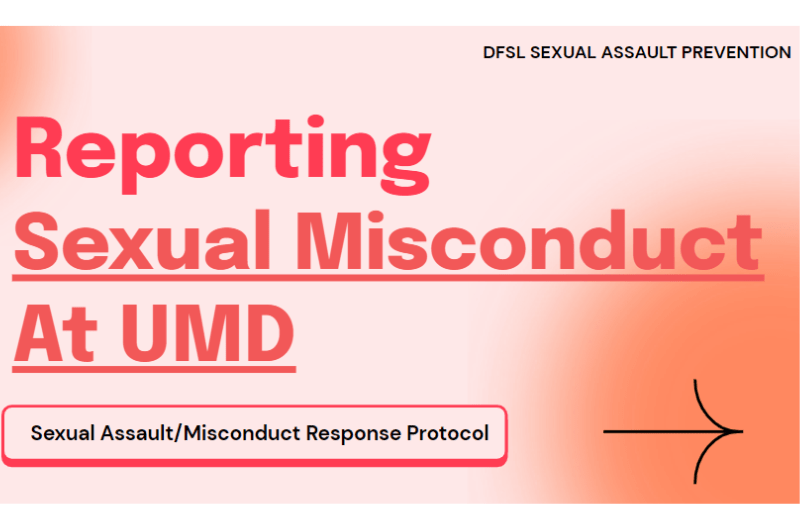
Reporting Sexual Misconduct at UMD
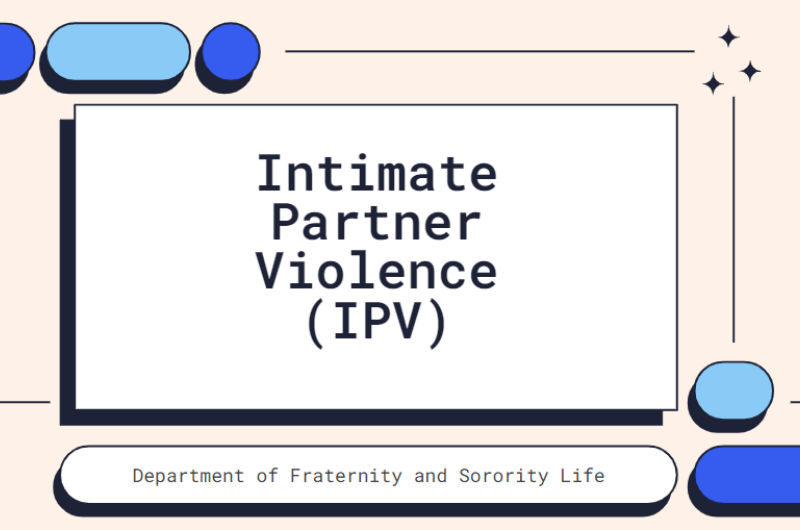
Intimate Partner Violence
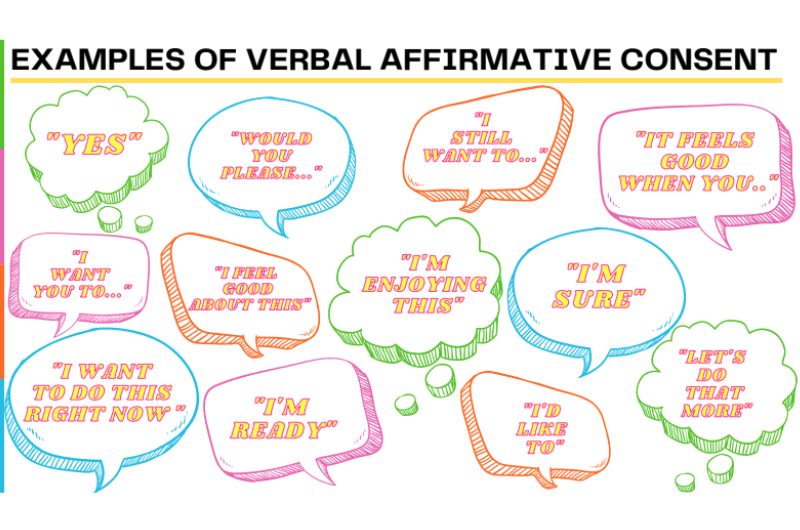
Consent

Away Weekends
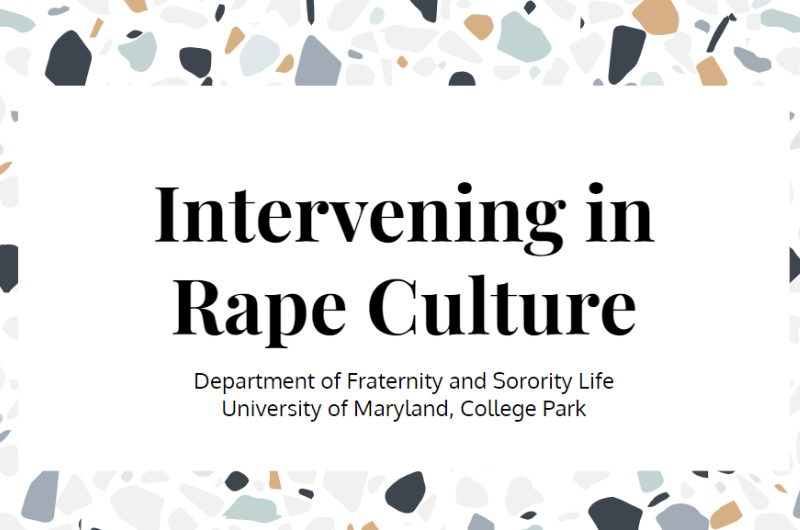
Intervening in Rape Culture
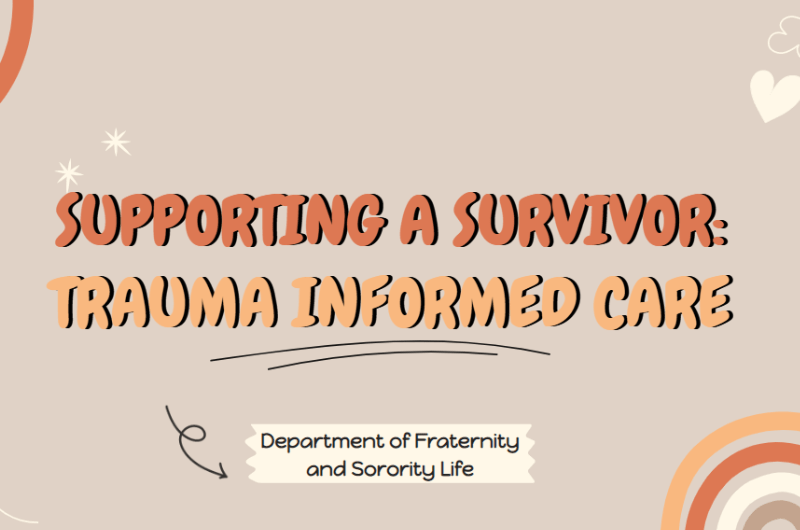
Supporting a Survivor
The Sexual Assault Prevention Committee is a university-wide sexual assault prevention and awareness group that organizes training and programs for the campus. For additional training and programs available to students, faculty, and staff, visit the Sexual Assault Prevention Committee page.
